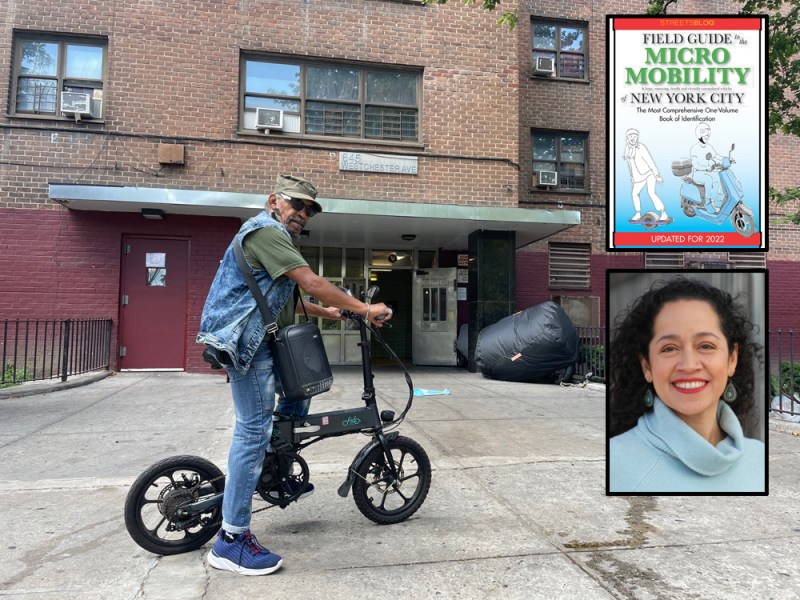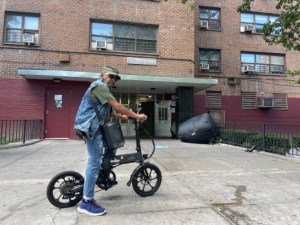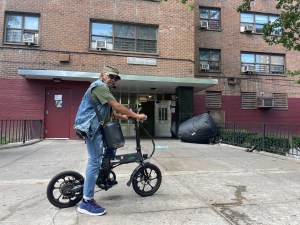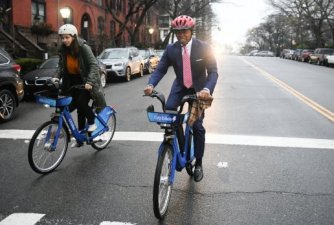Pol Pitches More Options to a Blanket E-Bike Ban on NYCHA Property

The city needs to do more before instituting its proposed controversial blanket ban on using or charging electric bikes anywhere on New York City Housing Authority property, a Sunset Park Council member told the housing agency’s boss last week, while also offering recommendations for addressing the rise in fires from some cheap e-bike batteries while not punishing the workers whose livelihoods depend on them.
Council Member Alexa Avilés, whose district has a high population of delivery workers, said that NYCHA’s all-out ban could hurt workers and residents more, especially because the ban would not differentiate from the myriad different micro-mobility devices out there, including the ones old folks rely on to get around, and would not actually stop anyone from using them.

But in a letter to NYCHA CEO Greg Russ, Aviles was careful to stop short of making her own blanket opposition, saying she recognized the very real dangers of lithium-ion batteries, especially ones that are cheaply made and sold second-hand. The potential rule changes come after a spike in deadly infernos linked to the batteries, recently killing a 5-year-old girl and a 36-year-old woman in Harlem on Aug. 3. This year, the number of fires caused by lithium-ion batteries is expected to double from 2021, according to the FDNY. So far this year, there have been 144, compared to the 104 in all of 2021.
Aviles offered eight recommendations in her Sept. 6 letter to Russ, who is stepping down after the agency was embroiled in a scandal over arsenic in its water (which, it turned out, was not). Aviles’s letter even linked to Streetsblog’s seminal Field Guide to Micrombility as to what is and what is not an e-bike — a point of confusion for some members of the NYPD:
- Federal regulators must study this issue, to come up “smart solutions,” including legislation.
- NYCHA should issue rules on the storage and safety of batteries, rather than all electric bicycles, which fails to distinguish between the many different types of electric devices. “Without a battery, an e-bike is just a regular bicycle that poses no fire risk,” Avilés said.
- The city should regularly host special disposal events for e-waste products like batteries, and the FDNY’s fire safety and disposal recommendations should be sent to every NYCHA household in their home language
- NYCHA’s policy of not operating a business out of one’s home, which includes charging multiple batteries at once for the purpose of business, must be enforced.
- NYCHA and the Department of Transportation should partner to apply for federal grants to pilot new safe battery storage opportunities
- NYCHA must clarify that mobility devices such as electric wheelchairs are still permitted
- The city must demand that delivery apps such as Uber and DoorDash inform their workers of the risks and dangers
- The city should create and keep a registry of where these batteries are being sold and require them to educate employees and customers on their risks
NYCHA declined to comment on Aviles’s recommendations, saying only that the comment period for those affected by the potential ban closed on Sept. 6, and the agency is reviewing the responses.
“NYCHA is diligently reviewing comments, continuing its technical research and meeting with experts and stakeholders to determine the best course of action moving forward, and we will continue to work with our partners in the city to provide safe homes to our residents,” said NYCHA spokesperson Rochel Leah Goldblatt. “At this time, there is no new rule in place, and therefore no date for implementation.”
Goldblatt also declined to comment on whether the agency’s leadership shakeup, which was just revealed on Thursday, will impact the looming decision.
Aviles’s new recommendations join a slew of others that similarly attempt to push back against the proposed ban, including from her colleagues. Bronx Council Member Oswald Feliz told the Post that he plans to introduce legislation that would bar the sale of batteries that are not so-called certified batteries, meaning they comply with nationally recognized safety standards, like Underwriters Laboratories (UL), and Manhattan Council Member Gale Brewer told Streetsblog last month that she is also drafting legislation that would ban second-hand or refurbished batteries, beef up Fire Department education and outreach efforts, and demand that delivery apps such as Uber and DoorDash pay for the associated costs of better and safer batteries. She also floated the idea of installing charging stations in NYCHA-owned parking lots and called on Congress to come up with safety standards and regulations for such devices. But neither piece of legislation has been fully fleshed out yet or introduced.




